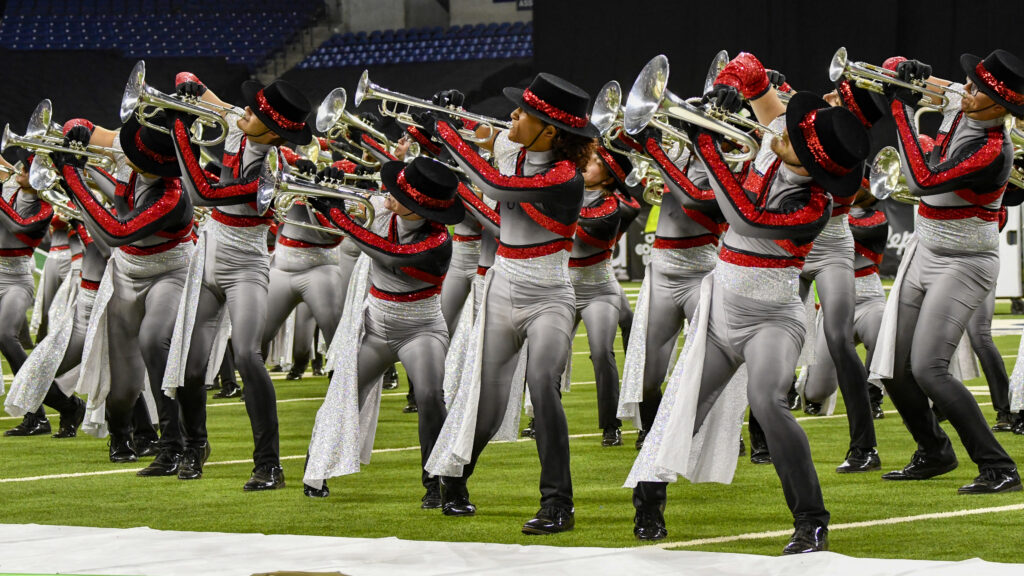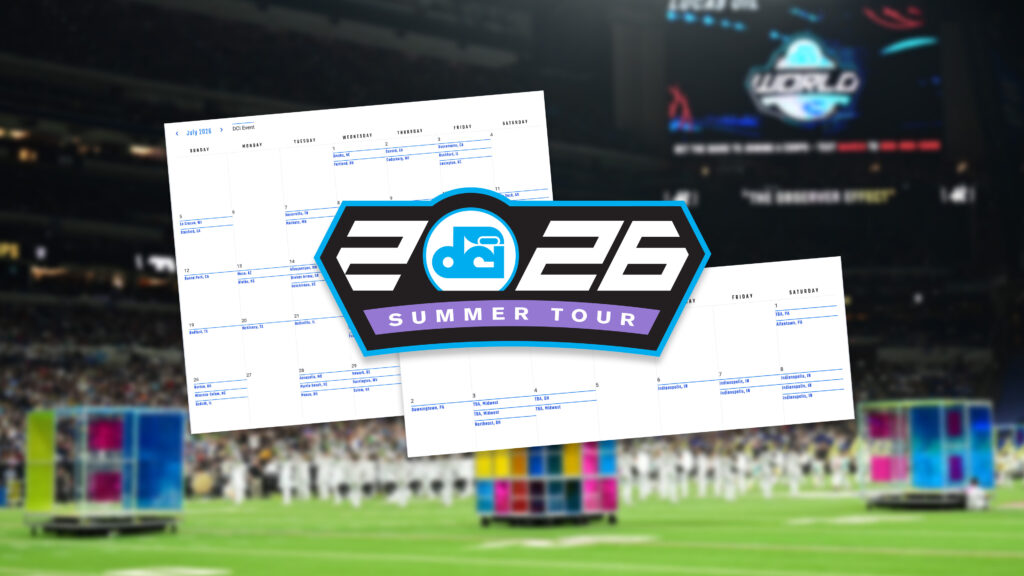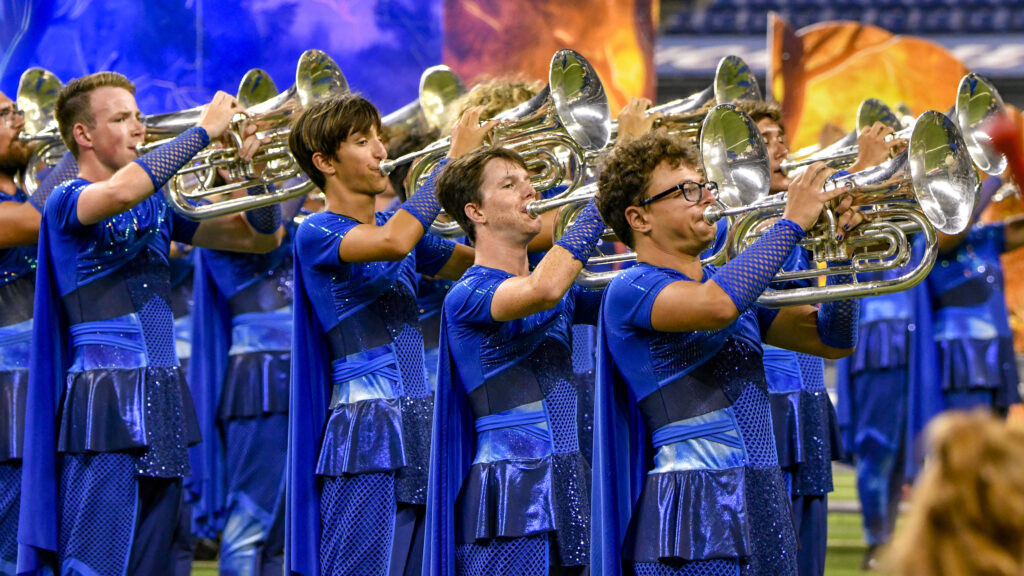Joe Itkor played in the front line (pit) of the Madison Scouts Alumni Reunion Project (MSARP) this summer. He accepted an offer to write about his experience. My drum corps career began back in 1982. I had marched in a class A corps from Lebanon, Pa., named the Pioneer Scouts and we went on the Drum Corps International tour. That’s the first time I was exposed to “open class” drum corps (known now as Division I). That’s when I knew that before I aged out, I had to march in an open class corps. In 1987, my ageout year, I went to an open class corps that was relatively local and tried out for the pit. I made it and was in the corps for seven months. Three weeks before the first show, a new pit instructor came in, along with two of his private students. He cut me and another guy. A friend of mine was in the Madison Scouts and asked me to come out there with him. Unfortunately, there were no pit spots available but they did need a few guard members. He knew I had indoor guard experience. So I piled all my stuff in my car and drove out to Wisconsin. I had an amazing summer in the color guard and also competed on marimba at the Individual & Ensemble Competition that year. Not only was it one of the greatest summers of my life, but I also became part of a family and a tradition of brotherhood. I am so thankful I was cut from that other drum corps. Fast-forward 19 years: I’m married, have two daughters and I like to say “I’m twice the man I used to be.” Unlike many of my Madison brothers, my ageout was not the last time I was in drum corps. Since 1989, I have been a player/instructor/pit arranger with the Bushwackers all-age corps in the DCA circuit. One day, out of the blue, I heard rumblings that there was going to be a Madison Scouts alumni corps that would perform at the championships in 2006. Not only that, but it would be made up of only alumni of the Madison Scouts. Most other alumni corps I’d seen opened membership to anyone regardless of past affiliation. I thought, “I have to do this!” Living in New Jersey, I couldn’t imagine the costs involved with travel, hotels, rental cars, etc. Being a teacher, with no income during the summer months, I knew I couldn’t afford it. But I had to do this. I reached out to Scott Pearson and asked if I could play in the front line and if I could, would it be possible to only do a few of the rehearsals due to travel expenses, etc. He said, “Yes.” I cleared it with my wife that I would go out to Wisconsin two or three times. I had gotten the green light. Then I got a call from Scott Stewart. Now you have to understand, Scott means the world to me. I don’t know many people that have made the impact in my life that Scott has. I also don’t know too many people that can say “no” to Scott. I know I sure can’t! But Scott called and told me that he needed me to commit to all 5 trips to Madison. I knew I couldn’t let him down, and again, I had to do this. Needless to say, my wife was very upset. She never understood the activity. All she saw was thousands of dollars being spent to gallivant around the country—to have fun with a group I spent a few months with 20 years ago. I contacted Taras Nahirniak, who was running the front line of the MSARP and told him I was definitely in. “T” sent an e-mail to everyone who committed to the front line asking them what they wanted to play and what they felt they had to offer. I responded, telling him about my experiences with the Bushwackers, and told him I felt my strengths were on timpani and marimba. I also told him that I understood since I had marched in the color guard, I would expect him to give those parts to the guys who played them when they were in the Scouts. I was a bit disappointed when the first piece of music I got was the tambourine part for the drum solo. Little did I know at that time, it would become one of my favorite parts of the show and eventually my claim to fame! I decided that I didn’t care what part they gave me, I was just glad to be a part of it. I would play the whole show on tambourine if that was what was needed! The next piece I got was the timpani part for the opener. Now I was in heaven. Not only did I get to play my favorite instrument, I got to start the show there. Then I got the bell part for the medley and eventually the marimba part for “Malague?±a.” My trip to Madison for the first rehearsal in February was exciting and scary at the same time. I didn’t know how I would be received. The guys in the front line could have laughed me off as some guy from the guard. The guys I knew from the guard could have laughed me off like “what’s this guy trying to do?” But there were two guys from the front line in 1987, Jim Heisinger and Alan Hillsthat, who knew me and made me feel a little more at ease. When I finally got there, it wasn’t like that at all. I felt like part of a gigantic family. Nobody cared what I did back in 1987… all they cared about was that I was their brother. That entire weekend was the most fun I’d ever had playing. Hearing stories of the ’50s, ’60s, ’70s, etc., made me start to realize just how big the Madison Scout family really was. Each time I flew to Madison got more and more exciting. At one of the rehearsals, Chris Theo, who was working with the percussion, got the idea that some of the auxiliary players in the drum solo should go out onto the field with the marching mallet players; Jason Herald on washboard, Matt Ronan on an old-style snare and me on tambourine. We choreographed how it would be done and it quickly became one of my favorite parts of the show. As the program started to take shape, the bonds of brotherhood grew stronger and I began building friendships I know will last my entire life. I started on this endeavor with the goal being the performance at the DCI World Championship Semifinals. That goal quickly changed to simply playing with great players, being part of an amazing front line, and calling these men my friends and my brothers.
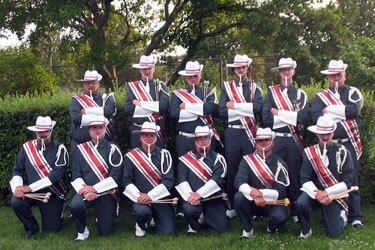
I remember the first time we all put on the uniforms to do the performance in Sun Prairie, Wis. I watched 240 men put on solid green pants and shirts. It really looked like simple janitorial suits. Then they added that magical sash. I call it a “magical” sash because it transformed a simple janitorial suit into the “Superman Suit.” The citation cord, the gauntlets, the spats and that special Madison hat with the red band around it all melded together to create what looked like the 1981 Madison Scouts. I remember standing at the truck in Sun Prairie before the show, watching 111 horn players in that uniform come marching up the hill with their hats tucked neatly in their left arm. I started crying uncontrollably. It was an amazing sight. I thought, “Oh my God, I’m really back in the Madison Scouts!” The performance was a lot of fun. When the crowd went crazy during the company front in “Ice Castles,” I cried yet again. That’s when I realized that with each performance, this thing was coming closer to ending. I realized at that point that after Semifinals, we wouldn’t be doing this anymore. I started to wish our Semifinals performance would never happen. With each camp weekend we got closer to each other, the show got better, we had more fun, we met more guys, we learned more about each other, we learned more about the traditions and rich history of the Madison Scouts, and we grew as brothers and as men. I think for me, the high point of the entire experience came the Wednesday night of the DCI World Championship week. We put on an exhibition with Jubal, Capital Sound and the Madison Scouts. We watched the Scouts perform and they went up to watch us. Seeing our little brothers screaming for us and knowing that we were all part of the same team was a truly spiritual experience. At the conclusion of the show, the 240 members of the MSARP, the current Scouts and other alumni in the stands (more than 450 in total) got together to sing “You’ll Never Walk Alone.” As we stood there arm-in-arm and brother-to-brother, I think we all realized that this was so much greater than each of us. This was 68 years of the Madison Scouts coming together to erase the years between us and join us all together in the traditions and family. Scott Boerma conducted us and during the silences between phrases, it was amazingly silent. You could have heard a pin drop in that stadium. That moment more than anything else summarized why I had to do this project.
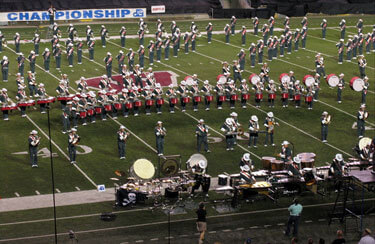
The night of Semifinals is kind of a blur to me. We all had dinner together and we wore our front line members’ hockey jerseys we had made. We went to the stadium and prepared for our final night together. The moment the first scout alum walked out of the tunnel, Camp Randall erupted in applause. I got goose bumps as we set up the equipment. The first hit in “The Way We Were” was deafening, both from the 111-man horn line and from the crowd going berserk. The rest of the show just flew by. I don’t remember much. I find the most exciting performances of my career are like that. You prepare for hours, spend thousands of dollars and it’s over in a heartbeat. There was a party at the Stadium Bar that night and the next day. They showed the video of our performance over and over again. I was unable to go as I had to leave very early the next morning to get back to New Jersey to be at a DCA show with the Bushwackers. That’s when I found out about my “close up.” Everyone started talking about “that tambourine player who was jamming out during the drum solo.” I was like, “Hey, that was me!” Next thing I knew, I was being treated like a conquering hero. All my friends started e-mailing and calling me. Michael Boo even contacted me and asked me to write this piece. While the fame and fortune (yeah, right) that goes with all of this is wonderful, nothing in drum corps is as wonderful as the experience I had preparing for it. It wasn’t about performing at Semifinals. It was really about playing with my brothers, learning about the “old” Madison scouts, being part of the history and traditions, reestablishing connections with friends I hadn’t seen in nearly 20 years, and being reminded that I will truly “Never Walk Alone.”
Michael Boo has been involved with drum and bugle corps since 1975, when he marched his first of three seasons with the Cavaliers.
He has a bachelor’s degree in music education and a master’s degree in music theory and composition.
He has written about the drum corps activity for over a quarter century for publications such as Drum Corps World, and presently is involved in a variety of projects for Drum Corps International, including souvenir program books, CD liner notes, DCI Update and Web articles, and other endeavors. Michael currently writes music for a variety of idioms, is a church handbell and vocal choir director, an assistant director of a community band, and a licensed Realtor in the state of Indiana. His other writing projects are for numerous publications, and he has published an honors-winning book on the history of figure skating. His hobbies include TaeKwonDo and hiking the Indiana Dunes. But more than anything, Michael is proud to love drum corps and to be a part of the activity in some small way, chronicling various facets of each season for the enjoyment of others.



